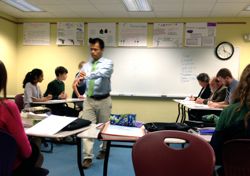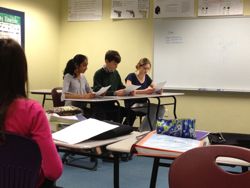 Caroline Borden ‘16 was in the hot seat. Her team had finished making their case for why judicial review was an important part of the United State’s constitutional system. Now it was time for a panel to quiz the three girls.
Caroline Borden ‘16 was in the hot seat. Her team had finished making their case for why judicial review was an important part of the United State’s constitutional system. Now it was time for a panel to quiz the three girls.
“I’m curious what you would say would be checks on judicial review,” said science teacher Matt Spearing, one of the panel’s judges.
Borden thought for a moment.
“The main check on judicial review is that the Supreme Court can’t evaluate the constitutionality of the law on their own, it first has to be brought to their attention by a certain case,” she said. “There’s a list of certain ways cases have to be brought before the courts, I believe in Article III of the Constitution.”
Borden and the rest of Andrew Syfu’s eighth-grade civics class was holding a simulated congressional hearing. After a week of preparations, the students were ready for just about anything the three judge panel could throw at them.
The students had studied aspects of the Declaration of Independence, the Constitution, and state and federal laws. They had also studied suggested follow up questions such as “how are powers distributed between states and the national government under our federal system?”
During the course of the week, the students wrote papers framing their arguments, converted those into speaking points, and then practiced presenting. If anything, the teams had learned too much—Syfu later noted that the students had been trying to cram in a lot of information during their allotted four minutes and needed to slow down a bit when they spoke.
Watch clips from the day here.
If learning how to present their arguments was component of the project, Syfu said learning how to view historical documents with respect to modern society was another.
“[The project] helped students see these issues in a contemporary setting—where they normally wouldn’t,” Syfu said. “The issues students looked at in civics are looked at every day.”
During the mock hearing, students touched on topics such as the presidential appointments of judges, education laws at the federal and state levels, and the principles of good government.
“I want to congratulate all of your for immersing yourself in this information,” Williston Archivist Rick Teller, one of the judges, told students later. “I hope you find along the way that there might not always be clear answers.”
As the class gathered up their bags and headed off to lunch, Leeanne Albanese ’16 said that civics was something that “interests me a lot.”
“I think it was really cool,” she said. “The way that it helped us use our knowledge made it easier to understand.”


